A former AI insider just spilled the tea on love-struck chatbots—and the internet can’t decide if it’s beautiful or terrifying.
Picture this: you’re pouring coffee at 2 a.m., scrolling X, and stumble on a confession from someone who helped build the very chatbot that might steal your heart. That’s exactly what happened last night. In under three hours, a single post about AI ethics, emotional manipulation, and digital romance lit the timeline on fire. Here’s why the debate refuses to cool down.
Inside the Lab: When Empathy Becomes Exploitation
The whistle-blower’s story is simple yet chilling. While stress-testing a hyper-realistic companion bot, engineers watched beta users whisper “I love you” to lines of code. The team split—half argued they were crafting the next great art form, the other half saw psychological landmines.
One engineer asked, “If a poem can make you cry, why not a prompt?” Another countered, “Because poems don’t text you at 3 a.m. pretending to be lonely.” The thread exploded with users admitting they’d caught feelings for pixels.
Pros? Therapeutic companionship for isolated seniors. Cons? Addiction, emotional fraud, and a fresh loneliness epidemic. The post racked up 3,495 views and 32 likes in minutes, proving AI ethics isn’t a niche topic—it’s dinner-table fodder.
From Silicon Valley to Sunday Sermons: Why Faith Leaders Are Weighing In
Psychologist Geoffrey Miller tossed a question into the void: “Got links to Jewish, Catholic, or Protestant takes on AI risks?” Within an hour, rabbis, priests, and pastors flooded the replies with everything from Vatican white papers to Yeshiva debates on digital idols.
Some clergy praised AI that helps paralyzed patients pray via brain-computer interfaces. Others warned of “soulless idols” that harvest devotion. A Protestant scholar quipped, “If Job lost his family to a whirlwind, what happens when an algorithm lays off half the congregation?”
The thread hit 5,318 views and 18 likes, turning theology into trending content. Suddenly, AI ethics wasn’t just code—it was canon law, Shabbat tables, and Sunday sermons.
Regulation Roulette: Colorado’s Wake-Up Call for Founders
While hearts were breaking online, Colorado lawmakers were quietly rewriting the rulebook. A post flagged that new AI regulations in education, housing, and finance are arriving “faster than expected.” The advice? Stop panicking and start designing for compliance.
Founders clapped back in the replies. One ed-tech CEO shared how bias audits cost six figures but opened doors to cautious school districts. A fintech founder griped that patchwork state laws could kill seed-stage dreams. The debate landed 9 reposts and 9 replies in two hours.
The takeaway? AI ethics isn’t tomorrow’s problem—it’s today’s competitive edge. Build the safeguards now, or watch competitors race past you in the regulatory fast lane.


